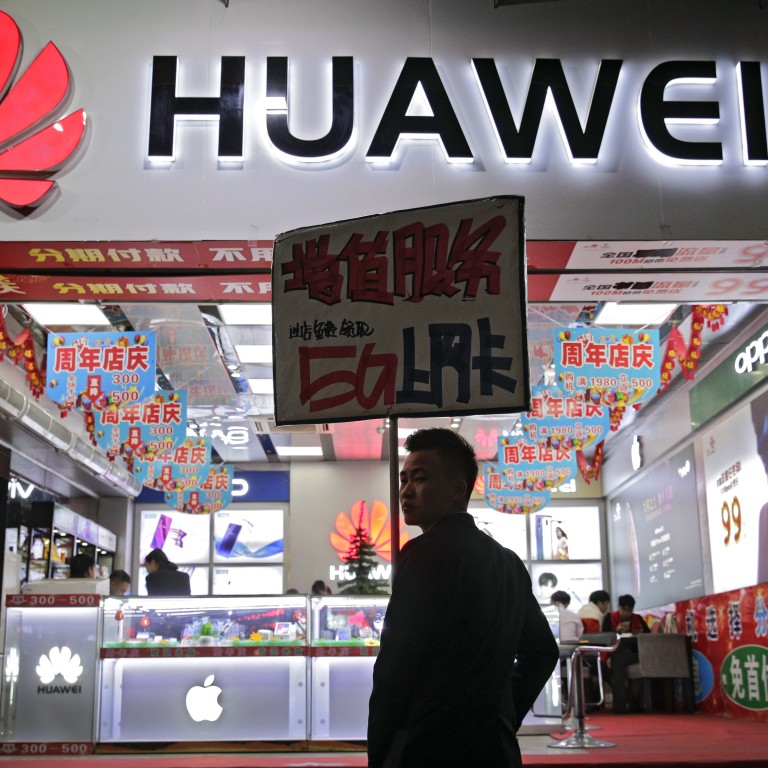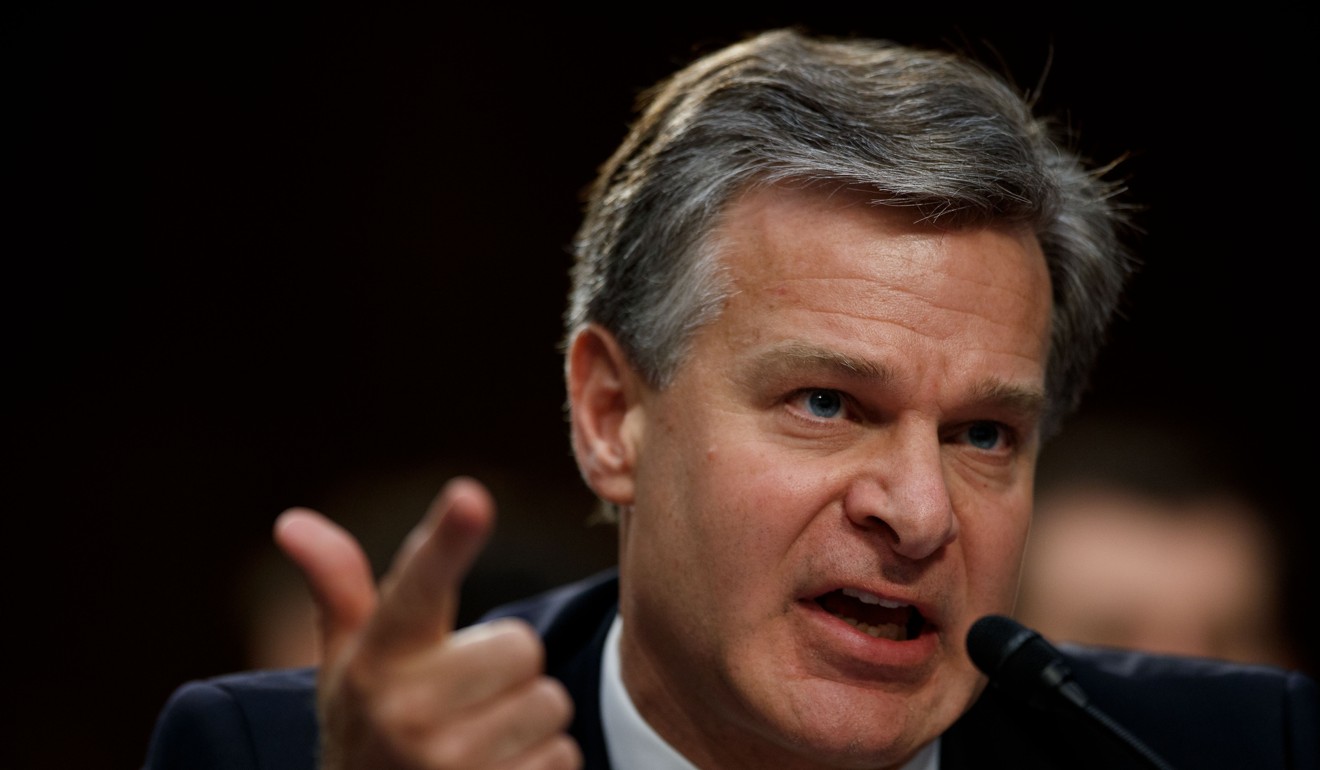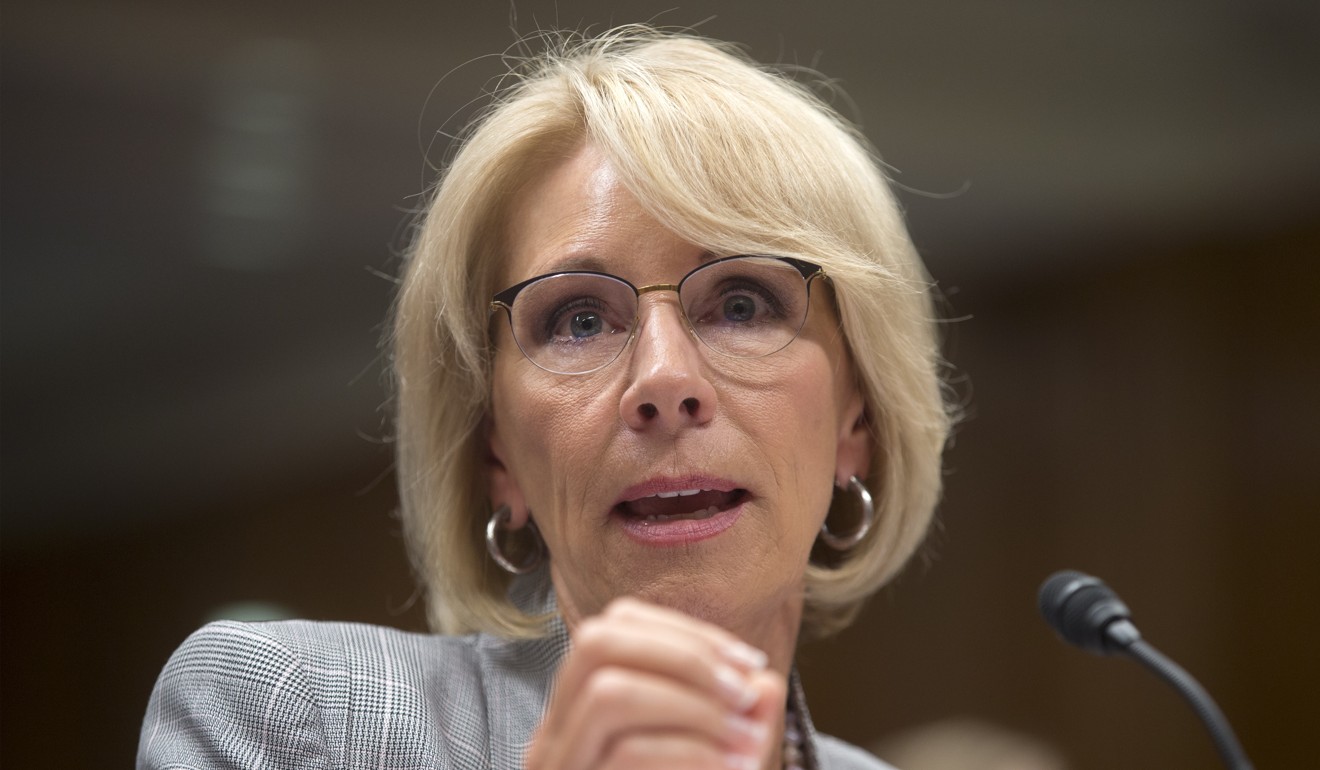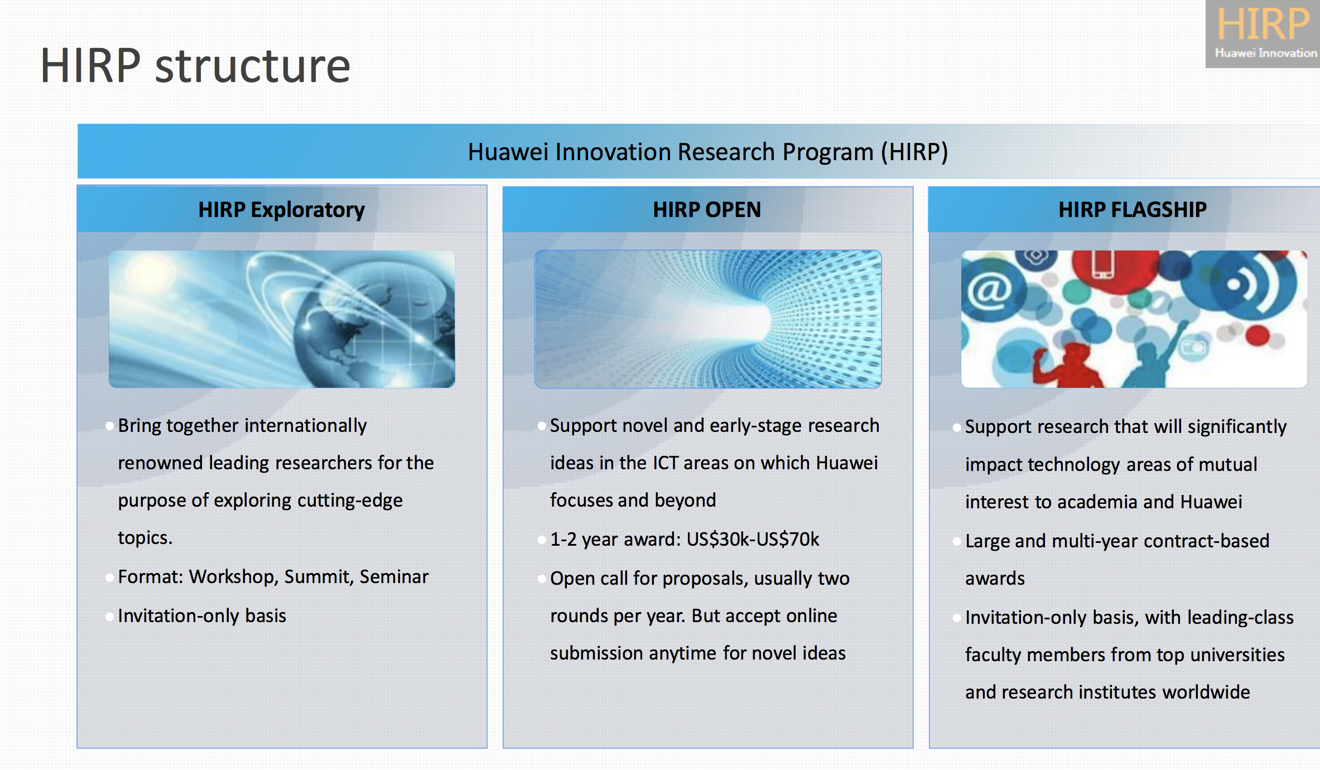
Chinese tech under the microscope: US agencies step up reviews of research activity on American campuses
- Huawei and other Chinese firms are the focus of growing US concerns about possible technology transfers in academic settings
- Agencies including the FBI, Department of Education and National Institutes of Health are coordinating efforts in look at Chinese-financed programmes
Huawei Technologies, China’s largest smartphone maker, broke into the American consciousness this month when its chief financial officer Meng Wanzhou was detained in Vancouver, British Columbia, on a warrant from the US, which seeks to extradite her on charges she committed fraud and violated sanctions against doing business with Iran.
But while her bail hearing made headlines over several days, US agencies had been stepping up reviews of Huawei’s activities on several fronts well before then, especially in efforts to track and monitor China’s participation in advanced research conducted at American universities, and the financial help its tech companies provide.
Watch: Huawei CFO Meng Wanzhou released on bail
The FBI, Department of Education, National Institutes of Health (NIH) and the Association of American Universities are some of the bodies now coordinating efforts to learn which faculty members at research universities and medical centres are receiving financial support from Chinese entities.
Prompted by warnings about the risk China poses to US national security, moves by the federal government to coordinate with the country’s top research institutions follow calls for action from various government agencies, US lawmakers and some think tanks.
Most notably, the FBI began to focus on China’s support for academic research in August, when its representatives met officials from Texas academic and medical institutions including Texas Medical Centre, the University of Texas and Texas A&M systems, the University of Houston, and MD Anderson Cancer Centre, according to an August 8 report by The Houston Chronicle.
That account said that the “unprecedented” gathering, which discussed “security threats from foreign adversaries”, was “the first step in a new initiative the bureau plans to replicate around the country”.
While the FBI did not single out Chinese funding as a target during the meeting in Texas, bureau officials, including its director Christopher Wray, have been vocal about the need to address national security threats that Beijing poses.

Speaking at a Senate Judiciary Committee hearing in Washington last week, Bill Priestap, the bureau’s assistant director of counter-intelligence, called China “the most severe counter-intelligence threat facing our country today”.
Two months ago, Wray said at a Senate Homeland Security Committee that “China in many ways represents the broadest, most complicated, most long-term counter-intelligence threat we face”.
The US government’s concern about China was amplified this week, when the US Justice Department announced criminal indictments against two accused hackers associated with the Chinese government.
Zhu Hua and Zhang Shilong, who the US say acted on behalf of the Chinese Ministry of State Security, were charged with conspiracy to hack into a dozen companies and government agencies in the US and around the world. The public announcement by deputy attorney general Rod Rosenstein follows the lower profile efforts with respect to academic research.
Many Americans who once championed engagement with China … now feel that [Beijing has] abused this openness at America's expense
The FBI declined to say where else it has convened meetings similar to the Texas gathering, noting only that: “The FBI regularly engages with the communities we serve. As part of this continual outreach, we meet with a wide variety of groups, organisations, businesses, and academic institutions.
“In recent months, the FBI has met with top officials from academia as part of our ongoing engagement on national security matters.”
The bureau faces fewer challenges in its efforts to investigate possible intellectual property theft and other vulnerabilities related to China. Areas of concern include investments by Chinese government-connected entities into advanced technologies like lasers and robotics, which have consumer and military – or “dual use” – applications.
“Many Americans who once championed broad engagement across the board with China as an investment in a stronger US-China relationship now feel that the Chinese government and its agents as well as state-connected companies have abused this openness at America’s expense,” said Jamie Metzl, senior fellow for technology and national security in the Scowcroft Centre for Strategy and Security at the Atlantic Council, a Washington-based think tank.
These governmental suspicions about research financed by Chinese entities on US campuses – and the new willingness to act on them – have profound implications. The exchange of students between the US and China, after all, has been a cornerstone of the two nations’ relationship extending back 140 years.
The first regular inflows of Chinese students to the US began after the Burlingame Treaty in 1868 granted China “most favoured nation” status in trade and opened the US to students from the country.
That paved the way for “the richest intellectual exchange in the modern world”, sinologist and author John Pomfret wrote in his 2016 history The Beautiful Country and the Middle Kingdom.
Chinese hi-tech researchers ‘told not to travel to US unless it’s essential’
These days, mainland Chinese academics, from university undergraduates to postdoctoral researchers, gravitate towards US programmes in science, technology, engineering and mathematics – the “STEM” fields of study.
Of the nearly 350,000 mainland Chinese students in the US in the 2016-17 academic year, 43 per cent were studying engineering, mathematics/computer sciences or physical/life sciences, according to data provided by the New York-based Institute of International Education. In contrast, just 23 per cent were studying business management.
Fears that American universities were, wittingly or otherwise, conveying valuable US research to Beijing prompted the US State Department in June to begin restricting the terms of visas issued to mainland Chinese academics in fields like robotics, aviation and hi-tech manufacturing.
What’s new about the FBI’s latest effort to stop this transfer is that it is not limited to mainland Chinese in the US. It also takes into account the wide swathe of individuals involved in research, including those who conduct the research directly, but also those who review scientific findings.
Asked for details about the August meeting, the NIH referred the South China Morning Post to a statement its director, Francis Collins, issued soon after the gathering. The security of biomedical research in the US, he said, was increasingly vulnerable.
Collins said that areas of concern include NIH-funded researchers’ failure to disclose substantial financing by other entities, including foreign governments; diversion of intellectual property to other entities, including other countries; and the sharing of confidential information by peer reviewers with others, including foreign entities.
The NIH referred further questions to the FBI.
Johns Hopkins bars foreign scientists over intellectual property risk
The US Department of Education is treating the risks just as seriously, with a new initiative directed specifically at Huawei, according to one person familiar with the matter.
Education Secretary Betsy DeVos “is known to have requested that several American research universities inquire into how many of their faculty have received donations from Huawei and under what conditions”, the source said.

The department declined to respond to emailed questions about DeVos’s initiative, which could have implications for Harvard University and other top-tier US academic institutions.
While the most recent headlines about Huawei have revolved around the arrest warrant for Meng, the company has been mentioned in several policy documents circulating in Washington for at least two years.
A report by the Pentagon in early 2017, which proved instrumental in passing legislation to tighten scrutiny of foreign investments in the US, called out Huawei as a threat.
Chinese companies “are approaching US academic institutions to promote joint research and attract future talent”, stated the report, “China’s Technology Transfer Strategy”.
“As an example, Huawei has partnered with UC Berkeley to focus jointly on artificial intelligence research,” according to the report, which was subtitled “How Chinese Investments in Emerging Technology Enable a Strategic Competitor to Access the Crown Jewels of US Innovation.”
“Huawei made an initial commitment of US$1 million in funding to cover areas such as deep learning, reinforcement learning, machine learning, natural language processing and computer vision. More recently, Huawei has approached MIT with an offer for a grant to build a joint research facility.”
The “crown jewels” report helped spur congressional passage of the Foreign Investment Risk Review Modernisation Act of 2018, which, among other things, expanded federal oversight of US acquisitions made by foreign investors.
A report commissioned by the US-China Economic and Security Review Commission and made public in July also portrayed Huawei as one of China’s “national champions”, a company that gets government support for its efforts to displace non-Chinese multinationals in global markets.
New report to US Congress supports a hawkish view on China
“In the case of Chinese national champions, the support also appears to include officially sanctioned or officially conducted corporate espionage designed to improve the competitiveness of Chinese firms while potentially advancing other government interests,” the report found, naming Huawei, along with ZTE and Lenovo, as tech companies “that exhibit some of these characteristics”.
Despite the warnings rumbling through Washington, Huawei has made no secret of its efforts to collaborate with researchers in the US.
The company promotes its Huawei Innovation Research Programme (HIRP) as a global initiative “to identify and support world-class, full-time faculty members pursuing innovation of mutual interest”, according to a programme website.

HIRP awards include one- or two-year contracts paying up to US$70,000 and multi-year contracts “to support research that will significantly impact technology areas that are of mutual interest to both the academic community and Huawei” and winners “may be invited to establish further long-term research collaboration with Huawei”.
The programme has collaborations with researchers at 78 institutions in the US compared with 59 in China, Huawei says in an online promotional video, which highlights work in the areas of remote medical treatment, “smart cities”, “internet of vehicles”, ultra high definition video and virtual reality and holograms.
In one Huawei presentation available online, Stanford, Harvard, Yale and the University of California Los Angeles are named as HIRP collaborators.
Stanford, Harvard and Yale did not respond to emails seeking comment about whether their faculty members are collaborating with Huawei. Tod Tamberg, UCLA’s director of media relations, did not respond to a voicemail.
Huawei’s HIRP representatives in the US did not respond to an email query about the programme.
With new scrutiny on what would have gone unnoticed in academia, fuelled by the predicament Huawei’s Meng finds herself in – as well as a high-profile sanctioning of ZTE earlier this year – also related to US sanctions violations, Chinese companies are finding the ground shifting beneath their feet.
“Chinese companies like Huawei that once might have supported academic research programmes in the United States without incident will now be viewed with a great deal of suspicion on the individual, institutional, and national levels because of this unfortunate history,” said the Atlantic Council’s Metzl, who was formerly a senior coordinator for multilateral affairs on the National Security Council.

